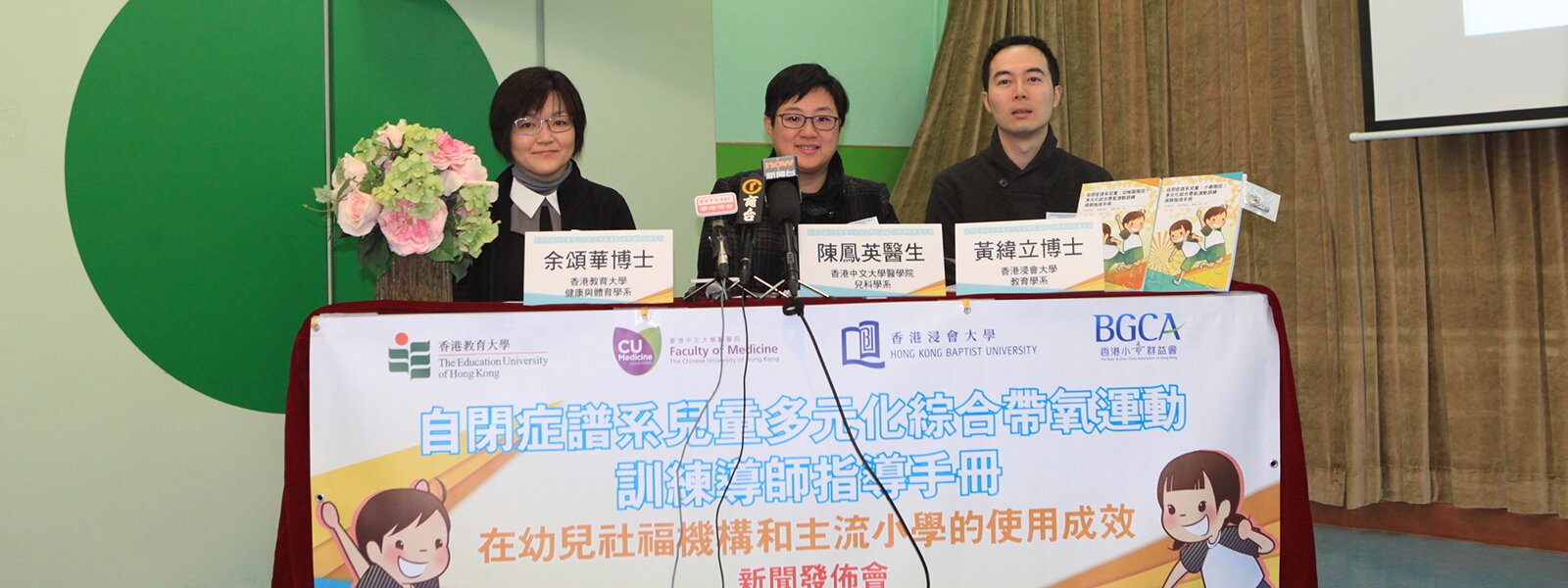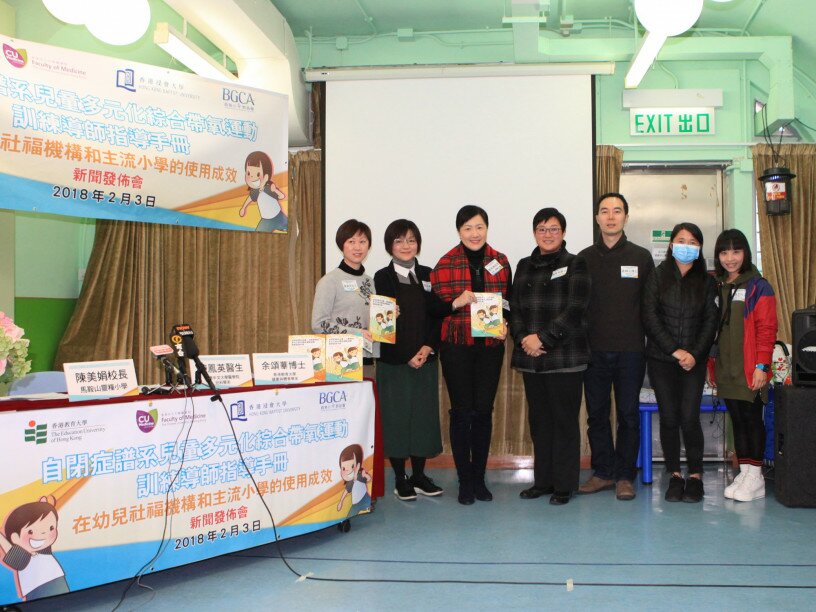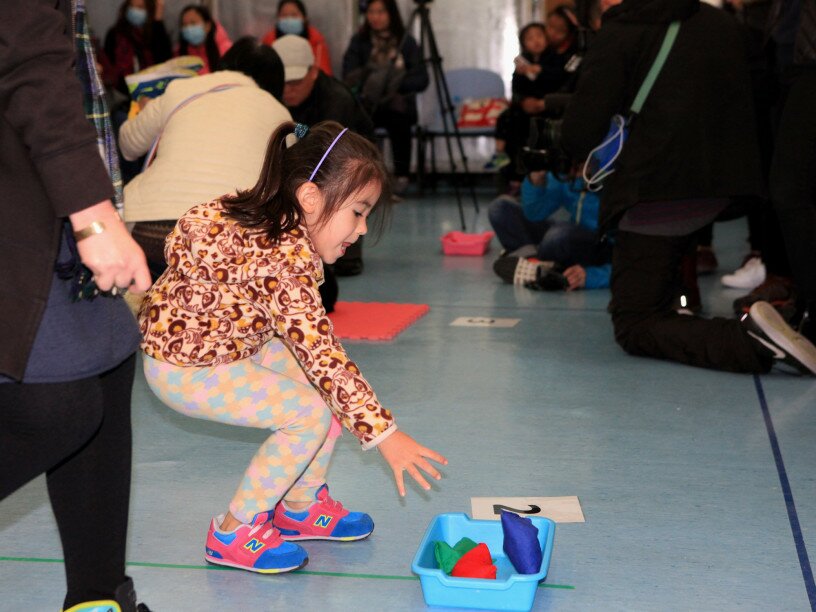Aerobic Exercise Teaching Manual Improves the Language and Social Skills of ASD Children
Aerobic Exercise Teaching Manual Improves the Language and Social Skills of ASD Children
An exercise manual (ASD) has been prepared by an expert team from The Education University of Hong Kong (EdUHK), the Chinese University of Hong Kong (CUHK) and Hong Kong Baptist University (HKBU) to cater for the needs of children with Autism Spectrum Disorder (ASD). Research results indicate that most of the parents of children with ASD who followed the manual reported that their children had experienced a significant improvement in physical fitness, the ability to follow instructions, concentration span, and language and social skills. The expert team suggested that the exercises in the manual be promoted and introduced in kindergartens, primary schools and social welfare organisations, and to teachers and practitioners working in the field.
The manual, titled “Diversity (Multidimensional) Aerobic Exercises for children with ASD, ‘Train the Trainer’ Manual”, is divided into two parts: one for three to six year olds (kindergarten level) and the other for six to 12 year olds (primary school level). It is specially designed for ASD children according to their respective characteristics, abilities and needs. Children are divided into small groups and receive aerobic exercise training in the form of games and physical activities, which include different elements.
The programme consists of four phases. Phase I establishes trust between the children and their coaches, and allows the children to get used to the programme’s training regime. Phase II promotes the children’s physical conditioning; Phase III promotes cardiopulmonary fitness and muscle strength by increasing the exercise intensity; and Phase IV focuses on reducing maladaptive behaviour and improving the children’s attention span. Large group activities are included in this phase.
The kindergarten manual has undergone pilot studies in two specialised child care centres and six centres from The Boys’ and Girls’ Club Association of Hong Kong (BGCA), the organisations that jointly run the ‘Train the Trainer’ Programme. Sixty-five children were involved and experienced a positive impact on their physical fitness, their ability to follow instructions, their language and social skills, and their concentration levels.
| BGCA | Special child care centres |
|---|---|---|
| Year of research | 2014 – 2015 | 2013 |
| Number of centres involved in the research | 6 | 2 |
| Number of children involved | 37 | 28 |
| Number of sessions | 32 | 32 – 64 |
| Training features | Run by coaches who have participated in the Train the Trainer Programme | Run by the research team |
| Clinical Global Impression Scale (CGI-I) (%) | ||||||
|---|---|---|---|---|---|---|
| BGCA | Special Child Care Centre | |||||
| Very much / much improved | Minimally improved | No change | Very much / much improved | Minimally improved | No change | |
| Endurance | 62.2 | 32.4 | 5.4 | 25.0 | 67.0 | 8.0 |
| Muscle strength | 57.1 | 34.3 | 8.6 | 33. 0 | 67.0 | 0.0 |
| Coordination | 48.7 | 48.6 | 2.7 | 50.0 | 50.0 | 0.0 |
| Ability to follow instructions | 16.2 | 64.9 | 10.8 | 58.3 | 41.7 | 0.0 |
| Social skills | 10.8 | 78.4 | 10.8 | 27.2 | 36.4 | 36.4 |
| Communication | 21.6 | 64.5 | 13.5 | 27.3 | 45.4 | 27.3 |
| Language understanding | 10.8 | 62.2 | 24.3 | 16.7 | 58.3 | 25.0 |
| Language expression | 13.5 | 62.2 | 24.3 | 16.7 | 58.3 | 25.0 |
| Attention shifting | 5.4 | 64.9 | 24.3 | 16.7 | 66.6 | 16.7 |
| Perseverance in completing a task | 16.2 | 56.8 | 24.3 | 25.0 | 58.3 | 16.7 |
| Attention to detail | 5.4 | 37.8 | 56.8 | 13.6 | 28.8 | 28.8 |
| Imagination | 5.6 | 44.4 | 41.7 | 0.0 | 16.7 | 67.7 |
Dr Clare Yu, Assistant Professor of the Health and Physical Education Department at EdUHK said, “The multi-dimensional training program incorporates diverse elements, such as aerobic and resistance training, fundamental movement skills, speed, and plyometric and agility development, to benefit the children, especially the younger age group.”
“This exercise manual has been implemented in two different studies, a pilot study and a ‘Train the Trainer’ programme,” said Dr Dorothy Chan, Honorary Clinical Associate Professor at Prince of Wales Hospital. “Both studies have shown that ASD children improved and enhanced different abilities as a result of the training. We hope the manual can be used to benefit children in kindergarten and primary schools.”
Dr Simpson Wong, Associate Professor from the Department of Education Studies at HKBU said, “Previous treatment for ASD children focused on their disability. This manual provides an opportunity for ASD children to explore themselves through exercise and sports in order to enhance their all-round development.”
The team plans to promote the manual to all non-government organisations, social welfare agencies, kindergartens, and primary schools. Briefing sessions, workshops and consultations will be held to give interested people an opportunity to understand the programme to promote a healthy lifestyle.








